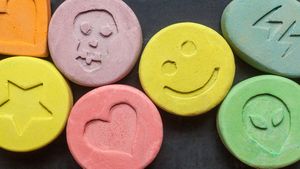MDMA: Difference between revisions
mNo edit summary |
mNo edit summary |
||
| Line 3: | Line 3: | ||
== Clinical Dosage == | == Clinical Dosage == | ||
Dosage is performed in the following stages... | Dosage is performed in the following stages...<ref>'''MDMA-assisted therapy for moderate to severe PTSD''': a randomized, placebo-controlled phase 3 trial, Jennifer M. Mitchell, Published: 14 September 2023, accessed 4 Dec via https://www.nature.com/articles/s41591-023-02565-4</ref> | ||
1. Recruitment and medical screening. Tapering of other medicines if needed. | 1. Recruitment and medical screening. Tapering of other medicines if needed. | ||
| Line 9: | Line 9: | ||
2. Prep sessions 1 and spaced over 2 weeks. | 2. Prep sessions 1 and spaced over 2 weeks. | ||
3. | 3. 3rd preparation session. Finish tapering off medications. | ||
4. 1st MDMA assisted session 80mg + | 4. 1st MDMA assisted session 80mg + 40 mg booster dose. | ||
5. 3 week break with a 90-minute integration session each week. | 5. 3 week break with a 90-minute integration session each week. | ||
Revision as of 03:40, 4 December 2023
MDMA, also known as ecstasy or Molly, is a synthetic drug produces both amphetamine-like stimulation and mild hallucinations. MDMA works by increasing the levels of serotonin, oxytocin, dopamine, and norepinephrine in the brain that might alter social perception.
Clinical Dosage
Dosage is performed in the following stages...[1]
1. Recruitment and medical screening. Tapering of other medicines if needed.
2. Prep sessions 1 and spaced over 2 weeks.
3. 3rd preparation session. Finish tapering off medications.
4. 1st MDMA assisted session 80mg + 40 mg booster dose.
5. 3 week break with a 90-minute integration session each week.
6. 2nd MDMA session 80mg or 120mg plus half dose booster.
7. 3 week break with a 90-minute integration session each week.
8. 3rd MDMA session 80mg or 120mg plus half dose booster.
9. Last, 3 week break with a 90-minute integration session each week.
10. Final integration session.
Effects
MDMA provides an experience that is mellower than with other psychedelics, creating feelings of empathy. May enhance fear extinction, resulting in a shift in perspective and improved ability to process traumatic memories. May provide insight into cognition, emotional regulation, and coping strategies. Causes dopamine release that is linked to addictive behaviors.
MDMA Comedown
There is a wide amount of anecdotal evidence and some scientific evidence[2][3] to suggest that after using MDMA there is an emotional comedown reported colloquially as "Blue Mondays". However, a recent, low powered study found that there was little evidence for this[4].
MDMA has a stronger effect in women
Women are more affected by MDMA's psychoactive effects than males[5]. Women especially have greater perceptual changes, thought disturbances, and fear of loss of body control. In addition, acute adverse effects and sequelae were also more frequent in female than in male subjects. In contrast, men showed higher increases in blood pressure than women.
References
- ↑ MDMA-assisted therapy for moderate to severe PTSD: a randomized, placebo-controlled phase 3 trial, Jennifer M. Mitchell, Published: 14 September 2023, accessed 4 Dec via https://www.nature.com/articles/s41591-023-02565-4
- ↑ Safety pharmacology of acute MDMA administration in healthy subjects. J Psychopharmacol 31: 576–588. Vizeli P, Liechti ME. (2017) Accessed on 20 Nov 2023 via https://pubmed.ncbi.nlm.nih.gov/28443695/
- ↑ Gender differences in the subjective effects of MDMA. Liechti ME, Gamma A, Vollenweider FX. (2001) Psychopharmacology 154: 161–168. Accessed on 20 Nov 2023: https://pubmed.ncbi.nlm.nih.gov/11314678/
- ↑ Debunking the myth of 'Blue Mondays': No evidence of affect drop after taking clinical MDMA. J Psychopharmacol. 2022 Mar;36(3):360-367. doi: 10.1177/02698811211055809. Epub 2021 Dec 13. . Ben Sessa, Jacob S Aday, Steve O'Brien, H Valerie Curran, Fiona Measham, Laurie Higbed, David J Nutt. https://pubmed.ncbi.nlm.nih.gov/34894842/
- ↑ Gender differences in the subjective effects of MDMA. Psychopharmacology (Berl). Liechti ME, Gamma A, Vollenweider FX. 2001 Mar 1;154(2):161-8. doi: 10.1007/s002130000648. PMID: 11314678. Accessed on 10 May 2023 via: https://pubmed.ncbi.nlm.nih.gov/11314678/
